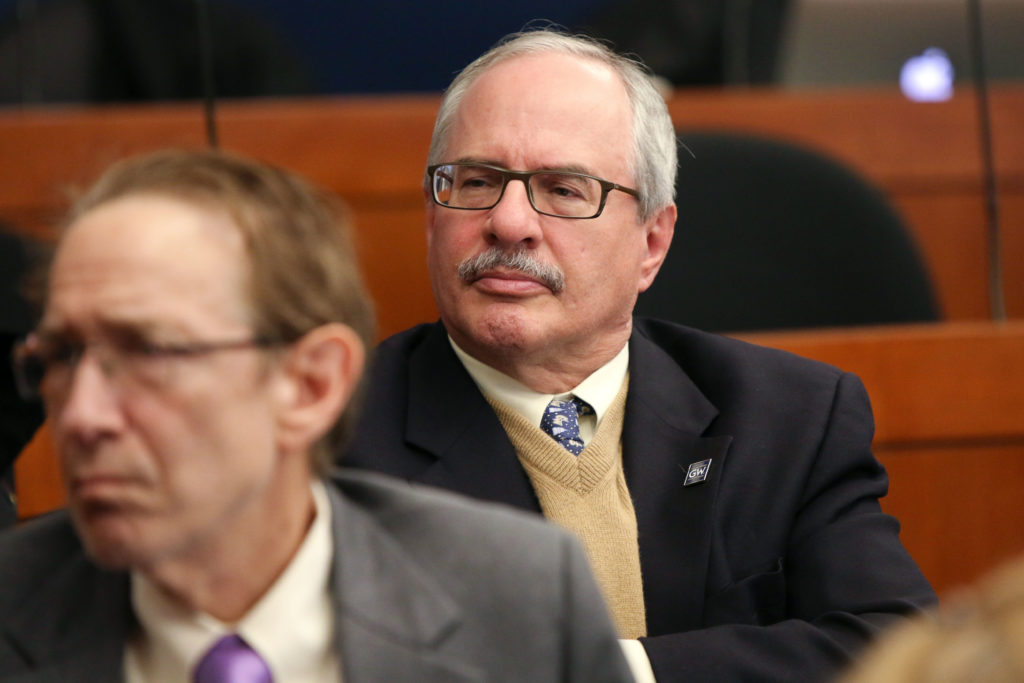An outside consultant is helping officials oversee the first review of University President Thomas LeBlanc’s performance this spring.
Nelson Carbonell, the chairman of the Board of Trustees, said in an email sent to the campus community last week that the review will include individual and group interviews with trustees, faculty, students, administrators and staff as well as a series of open forums. While the structure of the open forums and additional details about the review will be announced in the coming weeks, Carbonell said officials sought out the help of a third party to gauge the president’s strengths and weaknesses.
“Among the objectives of the assessment process are to examine the effectiveness of the president and to obtain feedback from key constituents on the progress of the president in achieving institutional priorities,” Carbonell said in the email to the community.
Carbonell said the University is hiring Sally Mason, a senior fellow at the Association of Governing Boards of Universities and Colleges – an organization that counsels and helps search for higher education administrators – to assist the board in the review by conducting interviews with the campus community later this month.
Mason previously served as the 20th president of the University of Iowa from 2007 to 2015 and is a former professor of biology, according to her biography. She is currently listed as a member of the Board of Trustees at Embry-Riddle Aeronautical University.
“Dr. Mason will gather information and engage members of the University community to share their perspectives,” Carbonell said in the email.
Carbonell added that Mason’s findings will be provided to the Board’s compensation committee, and a summary will be shared with the campus community. He said that when the process concludes, the feedback will be shared with the president.
“We believe AGB brings the most value to the university and will produce a comprehensive analysis in a timely manner,” he said in an email.
Carbonell said the schedule of interviews is still being developed, but people who have worked directly with the president will be interviewed about his progress on institutional goals. The schedule and structures for the open forums will be announced in the following weeks, he said.
He declined to say how much the partnership with AGB will cost. He also declined to say how long he expects the assessment process to last or how many interviews will take place.
Higher education experts said hiring a third party to assess the performance of the University president will ensure the process is objective.
University of San Francisco Provost and Vice President of Academic Affairs Donald Heller said performance reviews of university presidents are a “very good practice” and should involve key stakeholders, including officials who directly report to the president, leaders of the student government, Board members, alumni and donors.
“People often say that university boards have two most important roles: one is to hire the president and the second is to fire a president,” Heller said. “When a board hires a president, I think it is important that they do a check-in and see how the individual is doing on the job.”
He said student feedback can provide “valuable” information about the way the president interacts with students and listens to their concerns.
Heller added that public forums run the risk of attracting individuals who want to air their grievances even though they have not had any first-hand contact with the president, but an experienced outside firm can help filter the feedback.
“They can wade through these issues and weigh the value of the information they hear depending upon the source and the source’s amount of contact with the president,” he said.
Jennifer deCoste, the vice president for leadership strategies at Credo, a higher education consulting firm, said utilizing an outside consultant allows objectivity in the review process because the community can provide feedback confidentially and anonymously to someone that is not entrenched in the University’s daily operations.
“I believe an effective assessment includes an oversight committee to run the process, a clearly documented process, enough time to be thorough, a self-assessment by the president, confidential interviews with critical groups and individuals, an evaluation by the board, a report synthesizing all this information and is preferably run by an outside consultant,” deCoste said in an email.
deCoste added that LeBlanc’s performance review will be more thorough than an annual performance appraisal conducted at some other universities as it will involve stakeholders beyond the board and the president.
Britt Brockman, the chair of the Board of Trustees at the University of Kentucky, said the assessment process at his school also involves alumni and past board members to ensure that the evaluation is as thorough as possible.
He added that the school often hires an outside consultant during the review to interview members of the community. An objective leader can make broad recommendations that aren’t influenced by any administration, Brockman said.
“They come in with a great deal of knowledge and they know the questions,” he said. “They come in without bias, without a preconceived opinion.”





